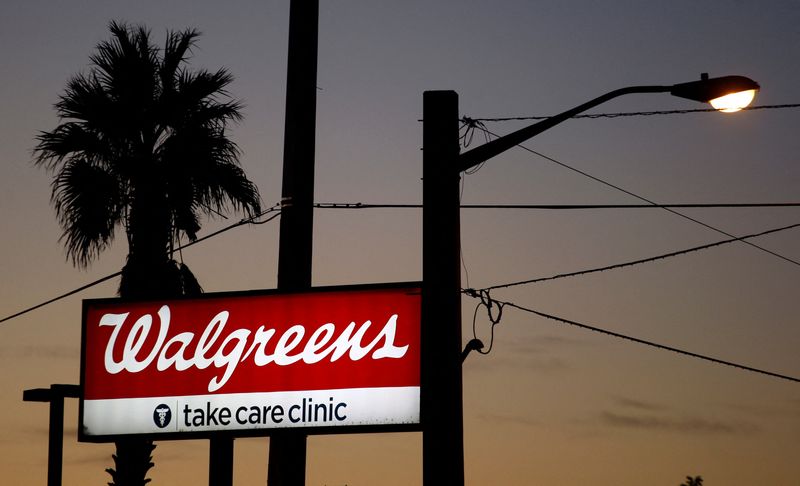By Dietrich Knauth
(Reuters) -Walgreens Boots Alliance said on Thursday it has reached a $683 million settlement with Florida to resolve claims that the pharmacy chain exacerbated an opioid epidemic in the state.
The settlement includes $620 million to be paid to Florida over 18 years, plus $63 million for legal fees.
Florida is the first state to settle its opioid claims against major pharmacy chains Walgreens and CVS Health Corp (NYSE:CVS), collecting more than $1.1 billion from the two companies.
The settlement ends a trial that began on April 11, after Walgreens decided not to join a combined $878 million settlement with four other healthcare companies, including CVS.
Walgreens did not admit to wrongdoing as part of the settlement.
Florida has recovered more than $3.6 billion in opioid litigation against drugmakers, distributors and pharmacies, according to Moody. It will spend most of the money on efforts to mitigate the opioid crisis in the state.
"I am glad that we have been able to end this monumental litigation and move past the courtroom," Florida Attorney General Ashley Moody said on Thursday during a press conference.
CVS Health Corp previously agreed to settle with Florida for $484 million, while Teva Pharmaceutical Industries (NYSE:TEVA) Ltd, Abbvie Inc's Allergan (NYSE:AGN) unit and Endo International (NASDAQ:ENDP) Plc agreed to pay a respective $194.8 million, $134.2 million and $65 million. All denied wrongdoing.
The nationwide opioid crisis has led to more than 500,000 overdose deaths in the last two decades, according to the U.S. Centers for Disease Control and Prevention.
More than 3,300 lawsuits have been filed against drugmakers, distributors and pharmacies over the crisis, including claims they played down the risks of addiction and overdoses, and were lax in monitoring where pills ended up.There has been a wave of recent settlements in opioid lawsuits brought by state governments.
Florida's settlement with Walgreens came days after Washington state reached a $518 million opioid settlement with drug distributors AmerisourceBergen (NYSE:ABC) Corp, Cardinal Health Inc (NYSE:CAH) and McKesson Corp (NYSE:MCK). Alabama recently settled with McKesson and Johnson & Johnson (NYSE:JNJ), while West Virginia settled with J&J.
As drugmakers and distributors settled, pharmacy chains remained a target in lawsuits by states, cities and counties.
Walgreens is also defending against an Francisco's opioid claims at a trial, and faces a damages trial next week in Cleveland over claims by two Ohio counties.
The Cleveland trial will determine the amount Walgreens must pay to address the opioid epidemic in two Ohio counties. A federal jury had found in November that Walgreens, CVS and Walmart (NYSE:WMT) Inc contributed to the opioid epidemic in the Ohio counties, the first trial they faced over the crisis.
Both Walgreens and CVS said that their settlements with Florida were based on "unique" circumstances in the state.

Both companies have previously been fined by the U.S. Drug Enforcement Agency for lax tracking of opioid pills in the state, and Florida's attorney general has reported that out-of-state drug users often traveled to the state for easy access to "pill mill" pharmacies that handed out opioids with little oversight.
Both Walgreens and CVS nodded to Florida's unique litigation history. Walgreens said it would continue to fight against opioid-related lawsuits in other states. CVS said that its settlement with Florida included a "substantial premium" due to the state's history with prescription pills.